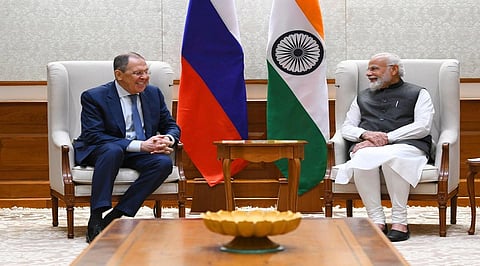

History, Winston Churchill said, is written by the victors. Who might be the victor in the horrific and brutal battle in Ukraine and who may be vanquished is yet to be determined. Indeed it is debatable if there will be any victors.
As Ukraine fights back to reclaim territory from rubble and ruins, as Russia attempts to refurbish its reputation weaponising words, nations of the metaphorical West are in a quest to save the rule-based world order from ruination. The chaos has presented China (and a wounded Russia) with the opening to present its own version of how the world order must be defined.
India, steadfast in its stance of strategic autonomy, finds itself in the spotlight. As the world’s largest functioning democracy with a billion voters and the sixth largest economy with the GDP at $ 3 trillion India is being actively wooed in a dynamic geo-economics campaign by both sides of the emerging geopolitical divide.
The parade of leaders calling upon India for its analysis and affiliation has caught the attention of the world. Among those who have visited India in the past fortnight include the Prime Minister of Japan, Foreign Minister of Austria, US Undersecretary of State, Finance Minister of Greece, Finance Minister of Oman, Foreign Minister of China, Special Envoy of European Union, Foreign Secretary of United Kingdom and the Foreign Minister of Russia.
India is serendipitously placed to convert attention to advantage – and leverage arbitrage between the competing options. The scale of its domestic market affords the economic clout to attract investments in manufacturing. Services account for over half the GDP of developed economies. India’s burgeoning skilled tech workforce – already serving transnationals and newly relocating data centres – is ideally placed to expand market share, ramp up exports and boost growth.
That said, realising the potential requires India’s policy makers step outside the box and shed the business as usual mindset, reset the legislative framework and recast the regulatory landscape to enable the domestic economy. To capitalise on the opportunity India must induct reforms that this column has repeatedly flagged – liberalise factors of productivity such as land and labour, liberate resources by privatising public enterprises, empower the farm sector by crafting backward and forward linkages.
Harvesting the upside entails expansion and activation of commercial diplomacy to create the pathways for ramping up exports. The treaties with UAE and Australia provide templates to catalyse exports in competitive sectors even as constraints are managed. It could offshore its carbon footprint by creating mechanisms – for instance a joint venture for fertiliser production in mineral and energy rich Saskatchewan; enhance its presence in Africa through collaborations.
For three decades since the end of the cold war the West bought into its own narrative – of the end of history. Regardless of the outcome in Ukraine it is clear that the war has injected a fog over the sustenance of the existing world order – verily, elements of a new order are manifest in the spectre of uncertainty. It should be scarcely surprising that matters have come to such a pass.
At a strategic level the West and votaries of globalisation were wrapped in a cocoon of complacency. It is not overnight that Europe finds itself dependent on Russian energy. It cannot be that the world was unaware that what was assumed to be a global supply chain was essentially a Chinese supply chain. The US which leads the parish nurtured the rise of China and Vladimir Putin’s paranoia. It continues to call Pakistan a strategic ally despite finding Osama Bin Laden in Abbottabad and in spite of knowing the ISI and the Pakistani Army were aiding and abetting the Taliban.
Aggravation has been catalysed by the stream of sermons delivered from the pulpit of circumstance and wealth. In 1930, John Maynard Keynes argued that once accumulation of wealth is no longer the primary measure of importance there will be great changes in the code of morals. “We shall be able to rid ourselves of many of the pseudo-moral principles which have hag-ridden us for two hundred years, by which we have exalted some of the most distasteful of human qualities into the position of the highest virtues.”
It would be hasty, even naïve, to assume that reading habits have improved, that the audience for Keynes has expanded or lessons are being revisited – not if one goes by the juvenile jibes of officials of the Biden administration who presume they are qualified to hector a democracy of 1.4 billion on constructing its response to emerging challenges. Someone somewhere in the US government must read up the IEA reports to learn that allies of the US in Europe buy gas and oil worth $ 700 million every day.
It is true that India must accelerate reforms and expand economic engagement widely to achieve its potential and deliver on billion aspirations. Equally it matters how the West engages with India. The West eroded the sanctity of existing architecture by placing it in the trust of convenient convictions. To preserve the rule-based world order it must recalibrate its compass, shed misplaced notions and rephrase the terms of engagement.